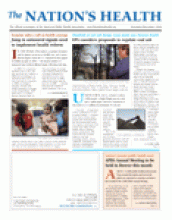Popular students can be sentinels for flu
College students who have the greatest social networks may come down with flu first and serve as sentinels for flu outbreaks, according to a recent study.

Students who have a lot of friends may have flu sooner.
Photo by Chris Schmidt, courtesy iStockphoto
Published in the September issue of Public Library of Science One, the study followed 744 students who were either a group of randomly chosen individuals or within a group of friends. Based on clinical diagnoses during a flu outbreak at Harvard College in 2009, the progression of the epidemic in the friend group occurred almost two weeks in advance of the randomly chosen group. The friend group also showed a significant lead time on day 16 of the epidemic, which was a full 46 days before the peak in daily incidence in the population as a whole.
The method “could provide significant additional time to react to epidemics in small or large populations under surveillance,” the study’s authors wrote. They suggested the sensor method could be used in conjunction with online search, such as Google Trends, to possibly “get high-quality, real-time information about the epidemic with even greater lead time, giving public health officials even more time to plan a response.”
Exam to be offered pre-graduation
Almost 80 public health institutions will offer the 2011 certified in public health exam as a pre-graduation test to students, according to the National Board of Public Health Examiners.
As a pilot test of the certified in public health exam, 79 academic institutions will offer the 2011 exam to students who have completed 21 credit hours toward their public health degree by Dec. 31, 2010. Those 21 hours must include completion of or concurrent enrollment in applicable core courses in biostatistics, environmental health sciences, epidemiology, health services and policy management, and social and behavioral sciences. Alumni from accredited schools or programs of public health also are eligible for the 2011 exam.
Registration for the February 2011 exam is open through Nov. 26. Learn more at www.publichealthexam.org.
The certified in public health exam will be discussed at APHA’s 138th Annual Meeting at session 3183 at 12:30 p.m. on Monday, Nov. 8.
Students forgo care because of stigma
Medical students with depression are less likely to seek treatment because of the perceived stigma linked to mental illness, according to a study in the Sept. 15 Journal of the American Medical Association.
A cross-sectional, Web-based survey of about 500 Michigan medical students found a depression rate of about 14 percent. Among women, the rate of moderate to severe depression was 18 percent, or twice that reported among men. Eight percent of third- and fourth-year students reported considering suicide, compared to fewer than 1.5 percent of first- and second-year students.
The study also found that students with moderate to severe depression were more likely to agree with the statement, “if I were depressed, fellow medical students would respect my opinion less.” They also were more likely to believe faculty members would view them as being unable to handle their responsibilities.
- Copyright The Nation’s Health, American Public Health Association









